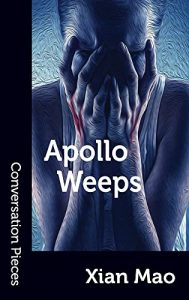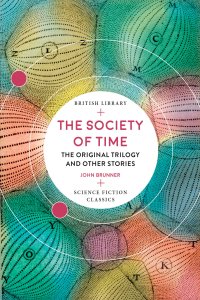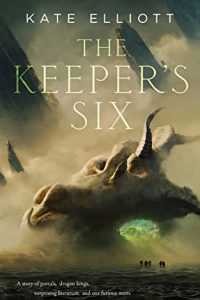Caren Gussoff Sumption Reviews Apollo Weeps by Xian Mao
 Apollo Weeps, Xian Mao (Aqueduct 978-1-61976-230-5, $12, 164pp, tp) January 2023.
Apollo Weeps, Xian Mao (Aqueduct 978-1-61976-230-5, $12, 164pp, tp) January 2023.
One of the greatest strengths of Aqueduct Press’s Conversation Pieces series is that it makes a home for work that simply wouldn’t neatly fit elsewhere. It’s described as a ‘‘grand conversation’’ on feminist issues, made of ‘‘an ever-shifting, fluid mosaic’’ of science fiction voices, across time and topic, and Xian Mao’s novella, Apollo Weeps, makes for tile 86 in this complex, growing picture. It’s an excellent pairing: Apollo Weeps is beautiful, and makes most sense when viewed through the lens of a greater context.
Alouette ‘‘Owl’’ Chagney is an awkward, intelligent, nonbinary writer who has returned to their hometown of Leroux, Iowa, to write a feature on the town’s only attraction – the grand, Gilded Age community theater known as the Cassandra. Owl, adopted from China by French ambassadors, was sickly as a child, shy as a teenager, and felt trapped by this quintessential American small town, so her return is a fraught one from the start. The only reason she has agreed is because the feature on the Cassandra means she will get to profile her oldest crush, the current artistic director, Madeline Grey (Maddie).
Owl gets to spend time with the still-beautiful, vibrant Maddie, but as they dig into the – literally – twisted family history behind the Cassandra, they unwittingly unleash the – again, literal – ghosts of the past. These ghosts take the form of the ‘‘Silver Man,’’ a masked saboteur, who, like the phantom of the proverbial opera, haunts the Cassandra, simultaneously protecting and revealing its secrets.
There’s a lot going on in Apollo Weeps: possibly too much to cover in the space the author has given it. There are secrets upon secrets, generational trauma that touches on historical racism and the ‘‘sundown’’ towns of the first half of the 20th century. There is a deeply embedded homage to the theater world, how shows get cast, propped, and produced, as well as an exploration of how cultural institutions were built on the backs of nameless generations of immigrants and marginalized people (the Cassandra itself was built on the site of a former potter’s field). There’s a story to Owl’s past: her difficult childhood; her health issues; cultural clashes with her adoptive parents; and her relationship with her incarcerated, activist brother, Philippe; as well as her unrealized yearning for Maddie herself, as a relationship candidate, but also for Maddie’s perceived ease, confidence, and self-assurance.
It’s too much for the short book to explore with any fullness. Backgrounds are sketched lightly, while important details are mentioned only once. There is, perhaps, too much to explore in such a short book. We barely meet the parents responsible for so much of Owl’s unhappiness, while we do get two flashbacks to Owl encountering her birth mother in China. Phillippe is portrayed as a significant support for Owl, yet we only get glimpses of him via short phone conversations. These are characters I would have liked to have been able to spend more time with, as opposed to Owl’s angry editor at the Garner District Daily. Cara appears in more than one scene, complete with inner and external dialogue, but I don’t feel like she adds depth to the story. She may as well be the grizzled editor-in-chief at the Daily Planet, barking at Owl for more pictures of Spider-Man.
Ultimately, the main thread centers on the story of Maddie’s broken family, allegorically echoed in the catacombs built beneath the Cassandra, housing the bones of those formerly interred in the potter’s field, as well as some of Maddie’s actual ancestors. This is the most compelling, insistent, and developed of the multiple plotlines, and while it’s interesting and heartbreaking, it’s also, for me, somehow, overly convoluted.
This main threadline builds quickly to an unexpectedly violent crescendo that I found difficult to follow. There’s a bit of whodunit, sustained for a few pages before the climax, but it’s a red herring. The villain is the hero, as in the invoked Phantom of the Opera.
It’s hard to say I loved Apollo Weeps, but I loved many things about it. Owl was a fully fleshed out nonbinary main character. The over-the-top gothic history of both the town and Maddie’s family was lushly sinister. I loved Mao’s impulse to unflinchingly look at how trauma is passed over generations, how secrets fester, and at the unspoken debt small-town America owes to its early immigrants and minority peoples.
It helps to return to thinking of Apollo Weeps in the context of an Aqueduct conversation. With so much stuffed into the text, all the bits and pieces form a shorthand that points towards larger ideas and issues. For me, Apollo Weeps does succeed, just as a means towards a different end than I might have expected.
Caren Gussoff Sumption is a writer, editor, Tarot reader, and reseller living outside Seattle, WA with her husband, the artist and data scientist, Chris Sumption, and their ridiculously spoiled cat-children.
Born in New York, she attended the University of Colorado, the School of the Art Institute of Chicago, Clarion West (as the Carl Brandon Society’s Octavia Butler scholar) and the Launchpad Astronomy Workshop. Caren is also a Hedgebrook alum (2010, 2016). She started writing fiction and teaching professionally in 2000, with the publication of her first novel, Homecoming.
Caren is a big, fat feminist killjoy of Jewish and Romany heritages. She loves serial commas, quadruple espressos, knitting, the new golden age of television, and over-analyzing things. Her turn offs include ear infections, black mold, and raisins in oatmeal cookies.
This review and more like it in the June 2023 issue of Locus.
 While you are here, please take a moment to support Locus with a one-time or recurring donation. We rely on reader donations to keep the magazine and site going, and would like to keep the site paywall free, but WE NEED YOUR FINANCIAL SUPPORT to continue quality coverage of the science fiction and fantasy field.
While you are here, please take a moment to support Locus with a one-time or recurring donation. We rely on reader donations to keep the magazine and site going, and would like to keep the site paywall free, but WE NEED YOUR FINANCIAL SUPPORT to continue quality coverage of the science fiction and fantasy field.
©Locus Magazine. Copyrighted material may not be republished without permission of LSFF.






